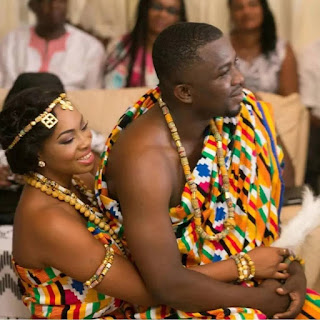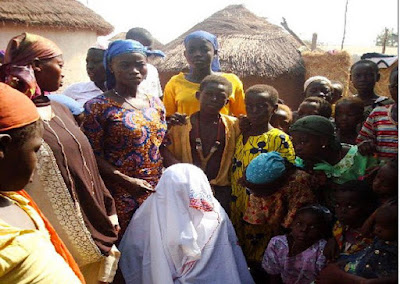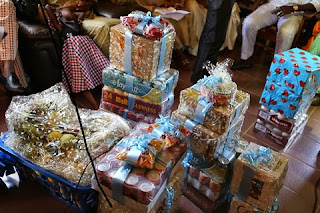Akyem Traditional Marriage
THE AKYEM TRADITIONAL MARRIAGE IN GHANA
WRITTEN BY: JACKLYN OMANE AMOATEMAH(DCS 20736)
Marriage becomes legally accepted when the customary marriage rites are
performed completely. In a nutshell, performance of the customary marriage rites
happens when parents, family members and friends of both the man and woman to
be married gather (normally in the house of the woman‟s parents) for the
ceremony. In the presence of the people assembled, the father, uncle (or a
representative) of the man presents the required items: three bottles of schnapps k
ככ k כ ” and two for the main ceremony “tiri nsa,” money (it is context
specific) and personal items (for the wife-to-be, also context specific) to the father
of the woman.
With all this display, the final words, “Yes I agree that you accept these items,”
from the wife-to-be “seals” the marriage.
Every marriage in Ghana must go through the customary rites before any church
weddings and/or court registrations.
Choice of residential type for newly married couples varies. Akan residential
patterns for couples go beyond what social anthropologists term as virilocality
(also known as patrilocality, i.e, the couple resides with or near the husband‟s
parents) to include matrilocality (also known as uxorilocality, i.e, the couple lives
with or near the wife‟s parents), avunculocal (i.e, the couple livies close to
husband‟s maternal uncle or the matrilineal descent group), neolocality (i.e., the
couple lives in a new home by the husband and wife) and duolocality (i.e., the
husband and wife live separately in their own family homes).
In some cases of duolocal residence, the husband establishes a new home for the
wife (and their children) but lives elsewhere, even outside his own family home.
Duolocal residence may occur for a number of reasons which including instances
where the husband is working in another town or country; or the husband is
involved in polygynous relationship(s) and so would prefer to go to the wife‟s (or
wives‟) homes rather than have them come to him.
Since every marriage is expected to be “fruitful” and procreate, (the number one
expectation about marriage), sterility (b כnyini) leads to marital problems which
can even end in divorce or
polygamy (where the husband may choose to have another wife or wives to bear
children for him). Sterility is gendered in that when the marriage doesn‟t produce
an offspring, it is the woman who is blamed for being sterile.
Male infertility is viewed as a private matter, handled with prudence, but that of
the female becomes a public problem.
WRITTEN BY: JACKLYN OMANE AMOATEMAH(DCS 20736)
Marriage becomes legally accepted when the customary marriage rites are
performed completely. In a nutshell, performance of the customary marriage rites
happens when parents, family members and friends of both the man and woman to
be married gather (normally in the house of the woman‟s parents) for the
ceremony. In the presence of the people assembled, the father, uncle (or a
representative) of the man presents the required items: three bottles of schnapps k
ככ k כ ” and two for the main ceremony “tiri nsa,” money (it is context
specific) and personal items (for the wife-to-be, also context specific) to the father
of the woman.
With all this display, the final words, “Yes I agree that you accept these items,”
from the wife-to-be “seals” the marriage.
Every marriage in Ghana must go through the customary rites before any church
weddings and/or court registrations.
Choice of residential type for newly married couples varies. Akan residential
patterns for couples go beyond what social anthropologists term as virilocality
(also known as patrilocality, i.e, the couple resides with or near the husband‟s
parents) to include matrilocality (also known as uxorilocality, i.e, the couple lives
with or near the wife‟s parents), avunculocal (i.e, the couple livies close to
husband‟s maternal uncle or the matrilineal descent group), neolocality (i.e., the
couple lives in a new home by the husband and wife) and duolocality (i.e., the
husband and wife live separately in their own family homes).
In some cases of duolocal residence, the husband establishes a new home for the
wife (and their children) but lives elsewhere, even outside his own family home.
Duolocal residence may occur for a number of reasons which including instances
where the husband is working in another town or country; or the husband is
involved in polygynous relationship(s) and so would prefer to go to the wife‟s (or
wives‟) homes rather than have them come to him.
Since every marriage is expected to be “fruitful” and procreate, (the number one
expectation about marriage), sterility (b כnyini) leads to marital problems which
can even end in divorce or
polygamy (where the husband may choose to have another wife or wives to bear
children for him). Sterility is gendered in that when the marriage doesn‟t produce
an offspring, it is the woman who is blamed for being sterile.
Male infertility is viewed as a private matter, handled with prudence, but that of
the female becomes a public problem.





Comments
Post a Comment